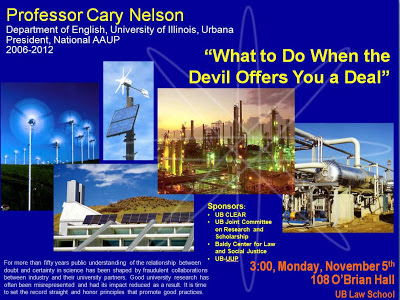- Make public all documents related to founding, funding, and governance of the Shale Institute
- Formally recall the Institute’s first publication
- Close the Shale Institute
Among their criticisms of the Shale Institute:
- The Institute’s founding lecture series was underwritten and tainted by secret oil and gas company money, and it’s present and future funding remains mysterious.
- The Shale Institute’s directors have conflicts of interest between their academic work and their extensive consulting work with oil and gas companies.
- The Institute offers corporate donors an improper governance role and privileged access.
- The Institute’s initial publication was and continues to be marred by false claims of peer review, undisclosed corporate ties of the authors, an unscholarly pro-fracking agenda, and major factual errors, never acknowledged or corrected.
“It is time for UB administrators remember that they are employees of the citizens of New York, not PR flacks for potential corporate donors with no genuine interest in education and scholarship,” added Holstun.
In April 2012, the University at Buffalo formed the Shale Resources and Society Institute. The Shale Institute came under fire in May, when it rushed out a pro-hydrofracking report without benefit of peer review. University of Buffalo professors have questioned the independence of the Institute, a review by the Public Accountability Initiative revealed fundamental errors in the report, and news accounts detailed undisclosed ties of its authors to the oil and gas industry. On 12 September, the SUNY Board of Trustees directed the University at Buffalo Administration to report on the Shale Institute. On 27 September, UB President Satish K. Tripathi delivered his report to the Trustees.
UB Administration's claims that no concerns were raised by "the relevant scientific community" about the report or the data used in developing the report’s conclusion were addressed in a letter to the editor of the university's newspaper by David Kowalski, Professor Emeritus in the Cellular & Molecular Biology Program, Roswell Park Graduate Division of UB, and member of UB CLEAR.
In the letter, Kowalski indicated that objectivity of UB Shale Institute report was compromised in favor of the gas industry and existing state regulations. He stated that the report should have been peer reviewed through an academic journal. "Scientists rely on the rigorous and critical peer-review process to ensure research integrity," he said. "The authors should have been held to the same high standards of peer review as the UB faculty."
About UB CLEAR - Coalition for Leading Ethically in Academic Research:
UB CLEAR is a coalition of University at Buffalo faculty, students, alums, and other community members who have been working together since May to bring transparency to the Shale Institute. Today, 29 October, they formally responded to the UB administration in a comprehensive and thoroughly-documented report sent to the SUNY Trustees: “UB CLEAR Response to the 27 September Report by UB President Satish K. Tripathi regarding UB’s Shale Resources and Society Institute.” They charge that the UB administration report is evasive and non-responsive to the Trustees’ request, providing yet another example of pro-fracking propaganda in academic guise.







